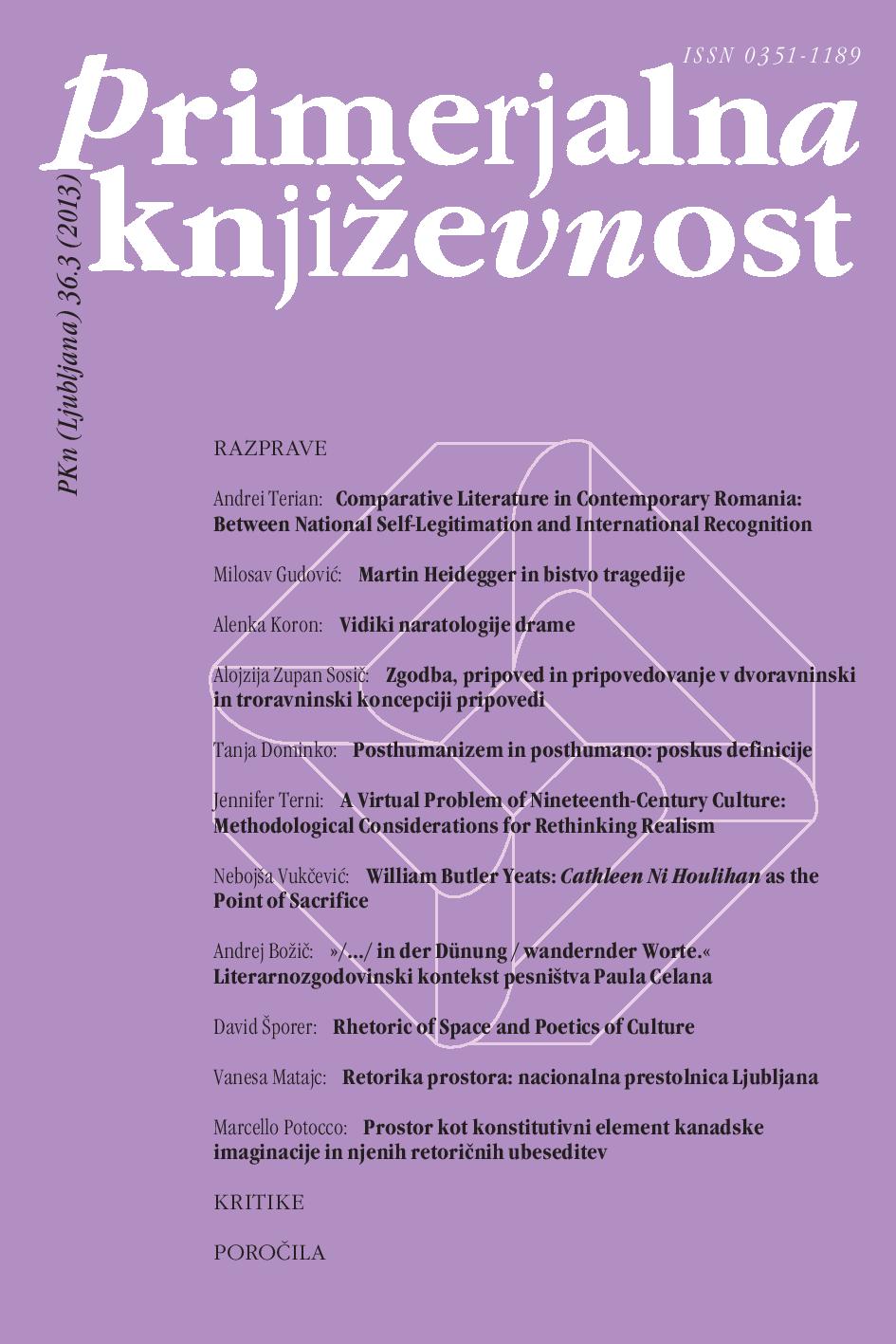The Rhetoric of Space: Ljubljana as a National Capital
Keywords:
literature and space, rhetoric of space, Slovenian literature, national identity, city, capital, Ljubljana, Mullaney, Steven, Peirce, Charles Sanders, Cankar, IvanAbstract
A city can be read as a “projection of cultural values and beliefs” (Mullaney) maintained by marking its space in forms of visual artifacts, ceremonies, and rituals. This article addresses how (a national) literature transforms the urban space of a national capital into a “text” of a (national) community. This question also highlights the role of the interpreter that reads these textual/spatial signs; that is, inscriptions in urban space (such as names of streets and squares, monuments and statues, material traces of literary-referential ceremonies and rituals, etc.). Examining these two questions, the article refers to Charles Sanders Peirce’s “semantic” trichotomy that, with respect to the relation between the sign and its object, differentiates three kinds of signs (icon, index, and symbol). This trichotomy serves to emphasize Steven Mullaney’s new-historicist reading of urban public places as “sites of potential meaning”; that is, rhetorical topoi that are (also) capable of very different “antithetical or ambivalent significance”. Therefore, their semiosis depends on the interpreter, who more or less shares his or her collective memory with the cultural community that writes inscriptions in the urban space it inhabits. However, in case of the literary cultures of central, eastern, and southeast Europe, in the course of the nineteenth and twentieth centuries this new-historicist contribution to the spatial turn in literary studies narrowed its focus above all to those inscriptions that refer to the transnational ideological repertory of “separatistic nationalism” (Leerssen), in which the privileged role acts a national literature. In these cases, literature contributes literary-cultural suggestions (understood in a collective memory) as well as its rhetorical principles of inscribing and re-employing these suggestions in culturally mapping the space of a national capital. The article explains Foucault’s concept of (national-ideological) power that performatively re-presented itself in the case of Ljubljana in 1918 by referring to Ruda Jurčec’s literary report on the funeral ceremony organized in honor of Ivan Cankar, who was conceived of as the greatest Slovenian writer. According to this report, the funeral ceremony used theater-like performance links to transform the selected public places into a network of national rhetorical topoi. Although they may suggest different, ambivalent, or even contradictory meanings, in case of the capitals of the future nation states, their predominant interpretation seems to derive from the national collective memory supported by national literature. Moreover, in the Slovenian case it seems that inscriptions/interpretations of national literature in the capital’s space maintained the status of the most historically resistant rhetorical topoi even in periods when national ideology split itself into various and complex mixes with the rival universalist political ideologies of the twentieth century.References
Burke, Peter. Kaj je kulturna zgodovina? Ljubljana: Založba Sophia, 2007.
Dolenc, Ervin. Kulturni boj: slovenska kulturna politika v Kraljevini SHS 1918–1929. Ljubljana: Cankarjeva založba, 1996.
Dović, Marijan. »Mreža spomenikov slovenske literarne kulture.« Slavistična revija 60.3 (2012): 339–350.
– – –. »Nacionalni pesniki in kulturni svetniki: kanonizacija Franceta Prešerna in Jónasa Hallgrímssona.« Primerjalna književnost 34.1 (2011): 147–163.
– – –. »Vodnik, Prešeren in začetki postavljanja spominskih obeležij slovenske literarne kulture.« Primerjalna književnost 36.2 (2012): 185–203.
Cankar, Ivan. Zbrano delo XVIII. Ur. Anton Ocvirk. Ljubljana: DZS, 1973.
– – –. Zbrano delo XXV. Ur. Anton Ocvirk. Ljubljana: DZS, 1976.
Geertz, Clifford. The Interpretation of Cultures. New York: Basic Books, 1973.
Jurčec, Ruda. »Cankarjeva smrt.« Ljubljanska knjiga. Ur. Andrej Inkret. Ljubljana: Slovenska Matica, 1994. 119–125.
Juvan, Marko. Literarna veda v rekonstrukciji. Ljubljana: LUD Literatura, 2006.
– – –. Prešernovska struktura in svetovni literarni sistem. Ljubljana: LUD Literatura, 2012.
Leerssen, Joep. National Thought in Europe: A Cultural History. Amsterdam: Amsterdam University Press, 2006.
Matajc, Vanesa. »Novi historizem: kompleksna interakcija v poetiki kulture.« Literatura 17.167–168 (2005): 81–108.
Mullaney, Steven. »Toward a Rhetoric of Space in Elizabethan London.« The Place of the Stage: License, Play, and Power in Renaissance England. Ann Arbor : The University of Michigan Press, 1997. 1–25.
Peirce, Charles Sanders. Izbrani spisi o teoriji znaka in pomena ter pragmaticizmu. Ljubljana: Krtina, 2004.
Pelikan, Egon. »Laibach/Ljubljana: Nationale und politische Selbstdarstellung im öffentlichen Raum um die Jahrhundertwende.« Urbane Eliten und kultureller Wandel. Ur. Christian Gerbel idr. Dunaj: Verlag für Gesellschaftskritik, 1996. 175–188.
– – –. »Theater, Politik und Gesellschaft. Aspekte der Geschichte des slowenischen Theaters in Ljubljana/Laibach in den Jahren 1867 bis 1918.« Kultur – Urbanität – Moderne: Differenzierungen der Moderne in Zentraleuropa um 1900. Ur. Heidemarie Uhl. Dunaj: Passagen-Verlag, 1999. 139–180.
Perenič, Urška. »Kartiranje biografij slovenskih književnikov: od začetkov do sodobne prostorske analize v GIS.« Primerjalna književnost 36.2 (2013): 163–183.
Prelovšek, Damjan. »Die Suche nach nationalen Ausdrucksformen in der Architektur am Beispiel von Ljubljana/Laibach.« Kultur – Urbanität – Moderne: Differenzierungen der Moderne in Zentraleuropa um 1900. Ur. Heidemarie Uhl. Dunaj: Passagen-Verlag, 1999. 181–196.
Senker, Boris. Uvod u suvremenu teatrologiju. I. Zagreb: Leykam international, 2010.
Slovenska kronika XIX. stoletja (II: 1861–1883). Ur. Janez Cvirn. Ljubljana: Nova revija, 2001.
Slovenska kronika XIX. stoletja (III: 1884–1899). Ur. Janez Cvirn. Ljubljana: Nova revija, 2003.
Slovenska kronika XX. stoletja (I: 1900–1941). Ur. Marjan Drnovšek, Drago Bajt. Ljubljana: Nova revija, 1997.
Slodnjak, Anton. Tujec. Roman o Cankarju. Ljubljana: Mladinska knjiga, 1976.
Šporer, David. »Poetika renesansne kulture: novi historizam.« Poetika renesansne kulture: novi historizam. Ur. David Šporer. Zagreb: Disput, 2007. 5–28.
Veeser, Harold Aram.«Introduction.« The New Historicism. Ur. Harold Aram Veeser. New York, London: Routledge, 1989.


